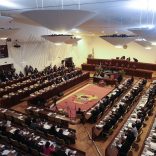Mozambique: Renamo Youth League demands release of former guerrillas - Watch
Mozambique: President criticises rich for back-sliding on climate commitments

Photo: Ministério da Terra e Ambiente
Mozambique’s president on Tuesday criticised the reluctance of industrialised countries to comply with the Paris Agreement on climate, noting that the Community of Portuguese-language Countries (CPLP) is among those most affected by climate change.
“For the goal […] to be achieved, carbon dioxide emissions must be reduced by 45% by 2030, which will be difficult due to the reluctance of industrialised countries to comply with the Paris Agreement,” Filipe Nyusi said during the opening of the VII International Congress on Environmental Education of CPLP Countries and Galicia.
The Mozambican head of state said the emission of carbon dioxide is the main factor in the cyclical occurrence of natural disasters, which mainly affect the countries that pollute less, including the members of the CPLP.
“These disasters have a greater effect on the countries that pollute less, such as those of the CPLP, Galicia and in particular Mozambique,” Filipe Nyusi said.
Among the natural disasters that have affected Mozambique in the last three years, Filipe Nyusi highlighted the trail of destruction left by the passage of cyclone Idai in 2019, with damage estimated at around $3.2 billion (€2.9 billion).
“In the specific case of Mozambique, the situation is aggravated by its geographical location, in an area of convergence of warm currents of the Indian and Atlantic oceans,” he added.
Portugal’s secretary of state for nature conservation and forests also acknowledged that the countries that pollute the least are the most affected by climate change but stressed the importance of coordination to achieve the objectives of the Paris Agreement.
“We need to set an example for the most polluting countries. We also need the more polluting countries to help the less polluting countries to maintain this biodiversity, which is a characteristic of the CPLP countries,” said João Paulo Catarino.
Catarino said that the Paris Agreement remained an “absolute priority” and that Europe had already understood that the measures defined cannot be postponed any longer.
“The risk of fires in Portugal will increase substantially in the coming years if this continues. In other words, we can no longer postpone the measures we have to take. In terms of reducing CO2 emissions, we have been making enormous progress. Today, Portugal produces around 60% of its energy from renewable methods”, he concluded.
The Paris Agreement, in force since 2016, set the goal of limiting the increase in the planet’s average global temperature between 1.5ºC and 2ºC above pre-industrial values.
Despite the commitments made, greenhouse gas concentrations reached record levels in 2020, even with the economic slowdown caused by the Covid-19 pandemic, according to the United Nations (UN), which estimates that at the current rate of emissions, temperatures will be 2.7ºC higher by the end of the century.
The VII International Congress on Environmental Education of CPLP Countries and Galicia will be held until Thursday in Maputo, bringing together over 500 participants, mostly from delegations of Portuguese-speaking countries.












Leave a Reply
Be the First to Comment!
You must be logged in to post a comment.
You must be logged in to post a comment.